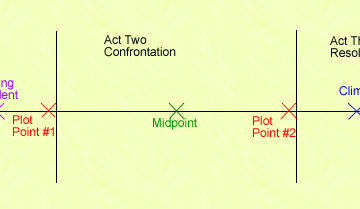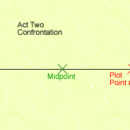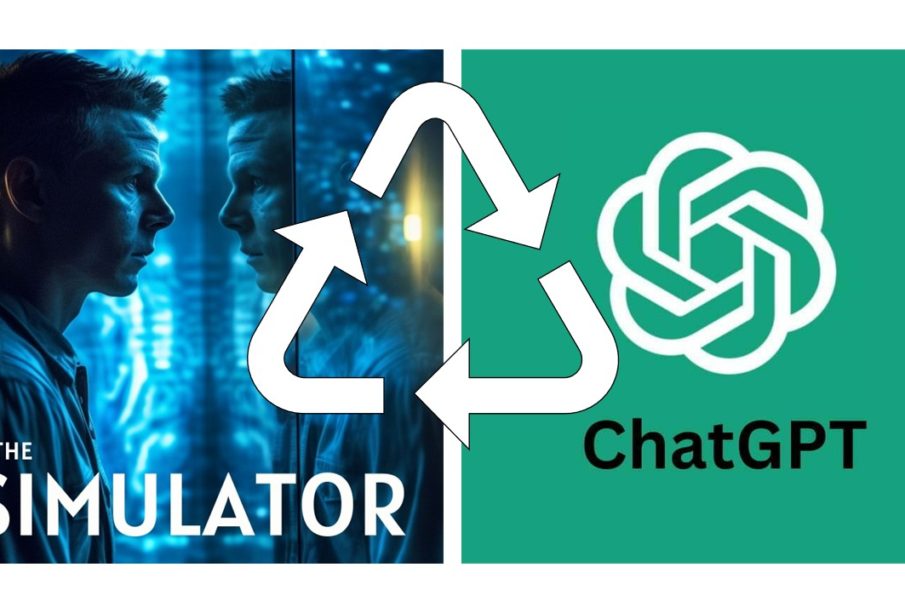
How to Convert a Movie Script into an English fiction Book Using ChatGPT
We are at the dawn of a revolution.
Not just any revolution, but a world-changing one, like the advent of the internet and mobile technology, and I assume most of you know or realize this. But in case you don’t, I’m happy to announce, the revolution has begun, and of course, I’m talking about all sorts of AI tools.
Anyone who knows me knows that I’m big into AI. I’ve had a paid subscription to Mindjourney for half a year, from the fourth model, and even developed a unique image style—you’re welcome to be impressed by it in this post. I also joined ChatGPT during its fourth model (the paid one). It seems that 4 is the right number to join revolutions. I remember even when I joined iPhone, it was at 4.
When I joined, the conversation around ChatGPT’s writing capabilities was hot. It certainly knows how to write good poetry. It also writes short prose pieces. Even scenes. Or, as shown here by several of my friends, it’s pretty good at developing documents, concepts, character descriptions, and even plot breakdowns.
But nobody has succeeded in writing a full book with it. That is, there have been several attempts, but the results are always banal and repetitive. It is incapable of generating a long and coherent plot, certainly not the length of a book. The difficulties of writing solely using ChatGPT were well described by YouTuber Sydney Faith in her experience video.
Unless…… you feed it a prewritten script and let it process it into a book. Which is exactly what I did.
I took a script of a TV series that I wrote a decade ago, long before I realized how much further Hollywood was than I thought, a script that sat in my “hidden gems” folder even though I loved its story. I pulled out the script and, using ChatGPT, turned it into an English-written book in a high American accent.
After checking the conversation about writing books using AI, I think there is an interesting opportunity here. Unlike writing from scratch, where GPT still gets tangled (at least for now), once you give it a base of a script, it delivers a much better result.
Why, in fact, would you want to turn a script into a book?
That’s an important question, and if you’re reading this post then you might already know the answer or at least the possible answers:
- Because sometimes it’s the only way to give it life – As Israelis, or actually in general, as non-Americans or non-English speakers, there are many movies that are very hard to make here. We are not strong in science fiction or fantasy, and there are no budgets to make such movies in Israel. Therefore, many times someone who has written a science fiction or fantasy script and discovered too late that it is too expensive and complicated for production finds that there is nothing to do with his script. That was the case with my sci-fi script “The Simulator” and that’s also what’s good about the new technique, now I can bring the story to life and make it happen at least as a book
- Because it does not harm the chances of the film’s production – Writing a book does not contradict the production of the film. On the contrary. It’s the realization of the story in another medium. My next project, for example, is actually a sci-fi script that I am going to produce soon, but its release as a book will only add to the hype of the story and its exposure.
These are the reasons I started the process and it was not simple. I learned along the way what the right prompts are, and the writing process was far from routine and forgetfulness but more like a coach guiding his athlete on the way to the championship: “Do this. Don’t give up. Do it again. Not good, correct here. Great, now continue.” But credit to the chat – it did the heavy lifting.
It’s still the story I invented, the characters I created and the dialogues and descriptions that I myself wrote, only instead of in a script, it’s now written in a book. But for extra assurance, I took an American proofreader at the end of the process to go over everything, really at the level of line editing, and make sure it’s indeed well written. She had work. But as mentioned, this was already editing work.
So, I am proud to present to you “The Simulator”, which tells the story of Jack Stone, an American Bionic agent who specializes in planning terror assassinations without ever leaving the simulation room, until one day he is invited to a virtual world MetaVerse style, reinvents himself, finds a taste for life and even love. But the crimes of his past come to haunt him in reality, and when they can’t find him there they follow him into the virtual world and endanger everyone he cares for until he is forced, for the first time since his childhood trauma, to stand up and act.
You are invited to read and see the result here and I would be very happy if you order the book in one of its two versions (I’m also working on an audiobook).
Simultaneously, for comparison purposes, here is a link to the original script of “The Simulator”, which you can compare.
Wait, how did you do that?
If you entered this post, you probably want to know in more detail exactly what I did. So here, I will explain.
Script Preparation
First, you will need to choose the right script because not every script, according to my experience, transitions well into a book. It’s preferable for it to be genre-based, rooted in physical adventure with extensive dialogues and clear location descriptions, and then it serves as a good basis for a book.
It doesn’t have to be written in English, although that would shorten the process. Specifically, the script of the Simulator that I processed was already written in English. In my next project, I am working on a script from Hebrew.
Once you have chosen the right script, you need to divide it into chapters. Like any literary writing or series writing, it is advisable to take chapters that have some sort of process and a tense ending, and that the chapter ends with the protagonist’s insight. The length of the chapters in the script you are working on should be about 1,000 words, aiming for the rewritten chapter to be around 2,000 words.
Word count tip – A regular Israeli script moves in the area of 10,000-15,000 words, while a book (depending on the genre) should be at least 50,000 words (in English, unless it’s a book for teenagers or middle school students, then even 30,000 words pass). This means you will need to expand certain descriptions and tell it what and what to expand.
Formulating the Prompts
This is the most technical and professional part. The prompts are essentially the instructions written for ChatGPT so it knows what to do. These are its commands. There’s an entire profession called “prompt handling” and you need to understand it a bit. I’m not pasting my prompts here, sorry, because I worked hard on them and I won’t just give them away. They won’t necessarily work for you without modification. In the coming month, I will be launching a detailed online course in which the prompts and how to rewrite them will be included.
But with all due respect to the profession of prompt handling, I personally don’t feel that I need it and I managed fine without it directly with ChatGPT. Here are some foundational guidelines:
– Give it an identity. Tell it what it is doing, for whom, and for which audience. Tell it that it is processing a script, that it is writing literature, in which genre, and for which target audience.
– Write detailed and precise instructions. The more detailed and clear the instructions, the better the result will be. For example, tell it that it’s receiving present tense (as in scriptwriting) but needs to write in the past tense (as in literature).
– Give it examples.
– Phrase its stages of work for it, what it is converting, what it is rewriting, what the desired length of the result is. Everything.
Important note: Everything I’m writing here is about working with the paid Model 4 of ChatGPT. If you work with the free Model 3.5, the result will be much less good and, in truth, unusable from my experience. Model 3.5 is relatively clumsy compared to Model 4, which is like working with a smart employee. Another important note, Model 4 is available for 25 prompts every three hours, so be careful not to exceed this and lose everything you’ve done because once it drops to 3.5, you can’t return it to 4. Why? No idea.
Conversion Process from Script to Book
Here comes the very specific stage in which we basically do:
– Copy a section from the script.
– Paste into GPT-3 with reinforcement instruction phrased like “process the following section according to the instructions I wrote for you”.
– Wait for it to finish (and in some cases also press an additional button to continue the processing because there’s a limit to the number of words per feedback).
– Copy the result into the book document.
– Repeat the process.
For those of you who are thinking, wait, can we simply automate it through Zapier or something like that. Technically, you are correct, but in my experience, the automatic result sometimes requires correction. Sometimes you want to change the opening and especially the ending, so it’s not a set-it-and-forget-it situation. It’s more of teamwork where you direct it on what to correct.
Many times, it gave me different results for the same section and in the book document, I edited a literary section from these results that was the best in my eyes.
And so, section by section, 300 words each time, which is what I recommend, which turns into 400 or 500 in the rewrite, and that’s how you do it until you finish the book.
Don’t believe it can handle the conversion from script to literary writing? Here’s an example. This is how the script opens. Note the stage directions and cinematic language:
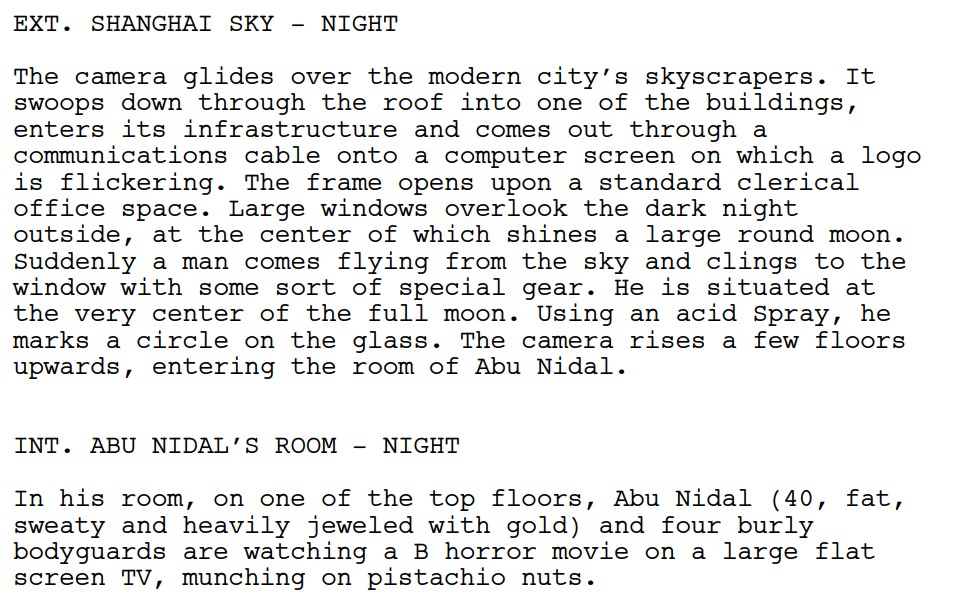
And this is what the ChatGPT wrote after many updates and instructions:
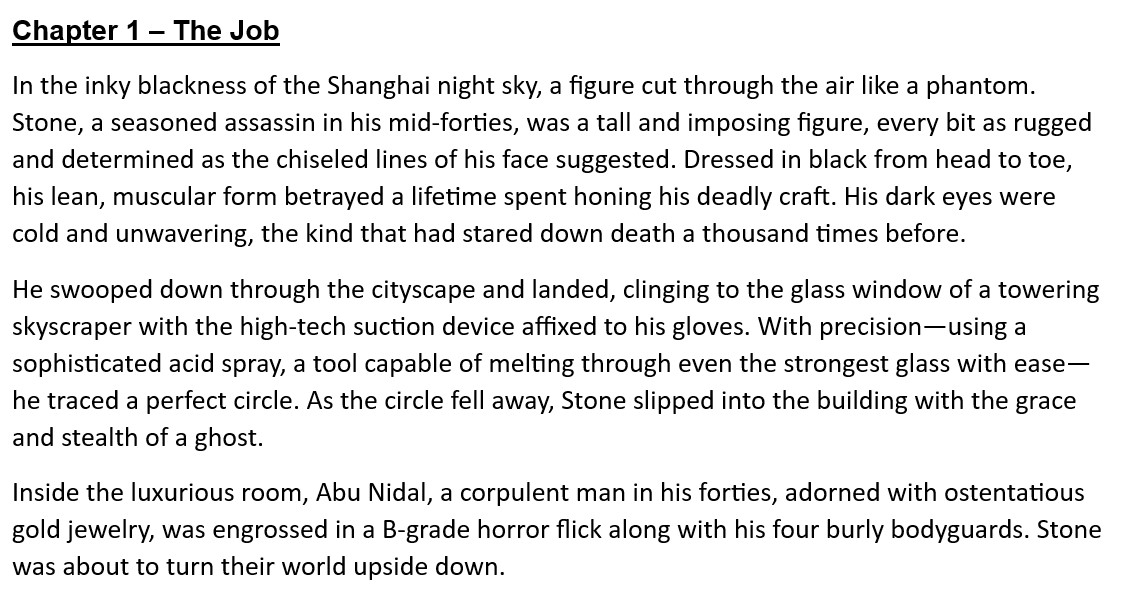
As you probably noticed, there are no cinematic instructions at all, and there is a focus, of course, on describing the main character at the beginning of the book. Doesn’t this sound like a literary style to you?
What was also amazing about the process is that many people write that it’s impossible to make ChatGPT use vulgarity or swear words, but since I fed it the script and explicitly instructed it not to skip any line of dialogue, it preserved everything that was written, and therefore it rewrote this:
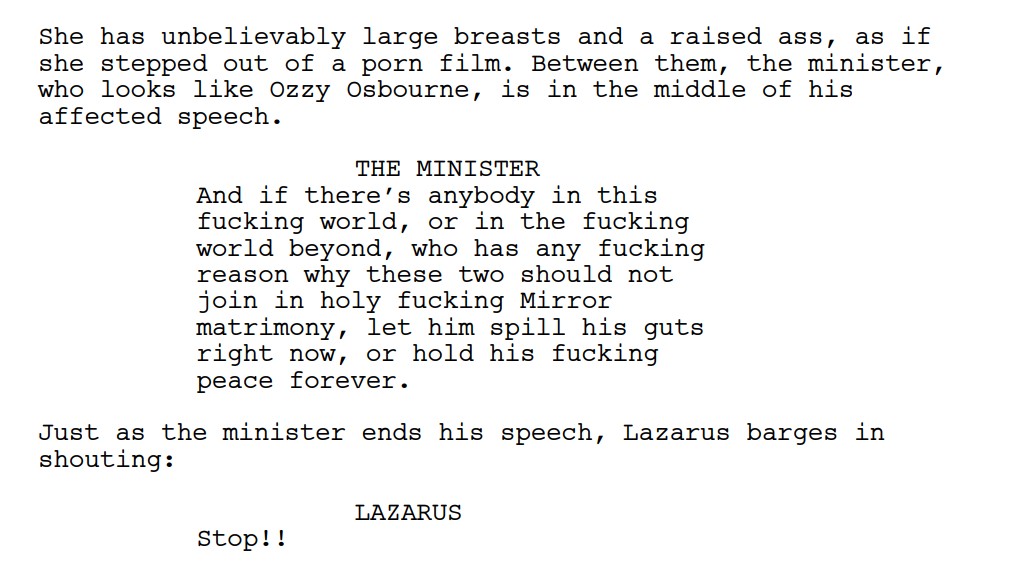
To the next literary passage, this time note that the difference is not that big, but it still changes the format and the descriptions:
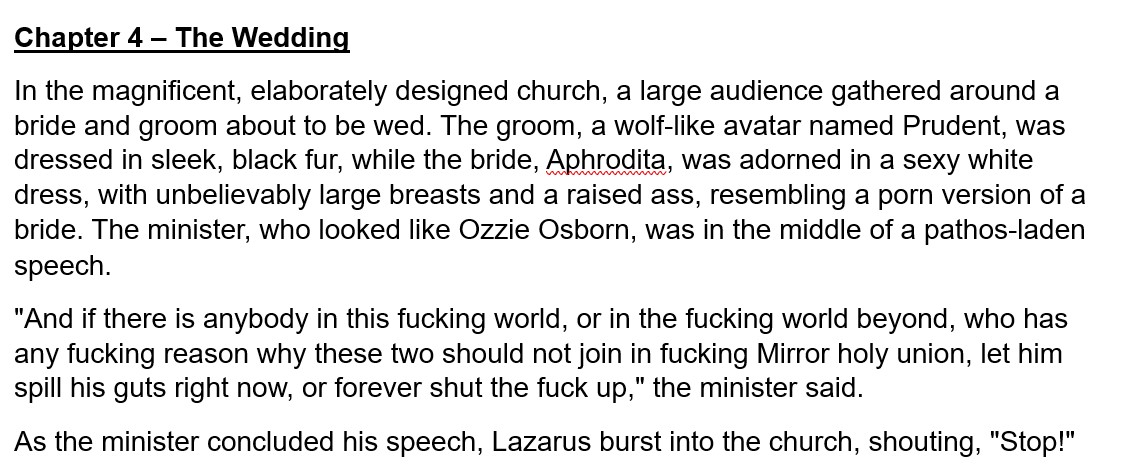
So maybe I deserve another compliment (a bit dubious) but for me, the chat is totally writing obscenities and curses.
So piece by piece, we turn the script into a book.
So the moment you’ve finished everything, you essentially have a basic book file. Congratulations!
Writing and editing the book
Although I accompanied it throughout the process, I went over the book again and made sure everything was coherent, and also added or shortened things. In some cases, I returned to GPT and pasted a piece and told it to correct, or rewrite or add.
And even though it writes excellent English and even though I instructed it to do linguistic editing and proofreading, the final stage was that I turned to an American linguistic editor to go over and rewrite the entire book. This is called line editing & proofreading.
I found someone really good on Fiverr and it cost me in the range of a few thousand shekels. In Israel, this editing can move in the area of 10,000 shekels. Some will say it’s a lot of money but the parallel process without AI would cost you over 60,000 shekels. So remember this in comparison.
The rewrite by Kate, my editor, was significant because she corrected many things that only Americans understand (like “there are too many noun adjective patterns in the sentences”)
And when she finished, my book was ready!
What is amazing from my perspective is that at this stage I checked my document against an AI writing checker. There are free tools on the web that check whether the text was written by AI or a human.
Here are the links –
https://openai-openai-detector–8j7k8.hf.space/
https://etedward-gptzero-main-zqgfwb.streamlit.app/
And I’m pasting here the score I received from this tool:

In short, the text of the book is about 99.98 percent human.
And this raises another discussion or thought, do I actually own the rights to this book?
Do I have copyrights on this book?
The legal aspect surrounding this issue is evolving and changing every day, but as of now, the answer is yes, and I’ll explain why. It’s not like ChatGPT invented the plot, the characters, and the story. It also didn’t write this from scratch. The script that I wrote already included, in a documented and provable way, the entire story, characters, locations, descriptions, and even the dialogues that are exactly the same in the book. And in the final stage, there was also human rewriting. So in terms of rights, GPT didn’t create anything here. It only processed. Just like Google Translate or Grammarly go through your texts and improve them, only in a more sophisticated and efficient way. Therefore, the story is mine and I own the rights to it.
This is another significant difference in my strategy of adapting a script to a book using ChatGPT compared to other authors who try to write a book with it from the idea stage.
I am currently in the process of obtaining copyrights from the U.S. Copyright Office so that it is official. You’re welcome to see here how to do it.
Cover Design
Not only did I create the book file with AI, but I also designed the cover.
I created the image on Imgur and the cover design on Canva. I even created a logo for my private publishing company. And I really love the result.
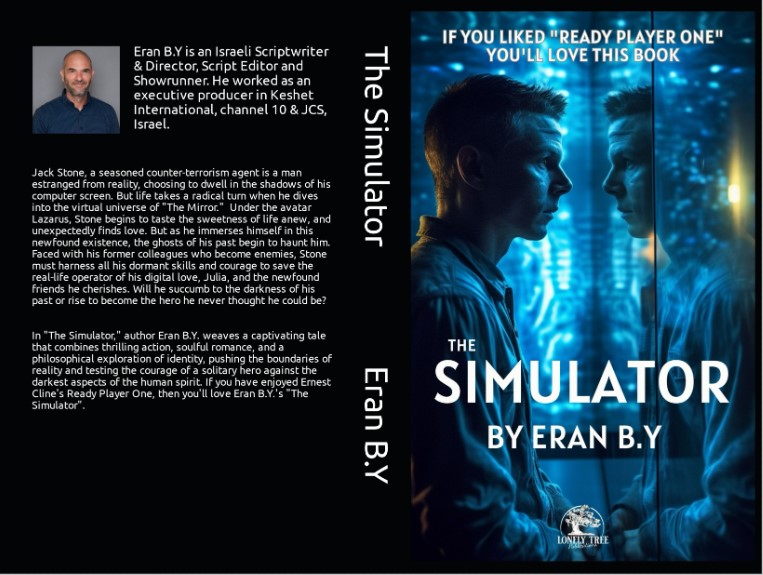
Uploading to Amazon
Once the book file was ready, I needed to upload it to Amazon. You can easily find someone to do this for you on Fiverr at a cost of a few tens of shekels, but I still wanted to do it myself and was surprised by how relatively easy it is. The whole world of publishing on Amazon is a whole world with lots of YouTube video tutorials. I won’t detail here because it’s basic, and everything I know I learned from this guy who explains in a few minutes how to upload a book to Amazon.
Link to the explanation of how to upload a book to Amazon.
Wait, is the book also in Hebrew? (or translated into other languages and audiobook)
Adapting a script into a book is one thing. Translating a book from Hebrew to English and vice versa is another. Firstly, ChatGPT is of course a native English speaker, and in Hebrew, it’s still a bit clunky. It translates better than Google Translate because it also captures the context and understands better how to translate, but in an interesting conversation I recently had with the author Oren Shlita, he had an interesting diagnosis – when translating a book from one language to another, something is lost unless there is a translator who knows both languages and both mentalities of the cultures of both the source book and the translation language – and that’s true. So, the chatbot knows how to translate well from Hebrew to English and a little less vice versa and still it does this less well than script adaptation because a script doesn’t necessarily have a literary style subtext. In fact, the style is created in the chat based on the story and plot of the script, and therefore, probably, the result is better than in book to book translation.
However, I plan to translate the book into other languages that are currently stronger in their interface with English such as Spanish, French, German, Russian, and Chinese. Ah, and also an audiobook, which is simply another release. What is true is that I found out along the way that someone from Israel who doesn’t have an American account can’t use Amazon’s audiobook platform but should try findawayvoices.com.
Updates to follow.
Summary
So this is the process I went through over about two months until the release of my book on Amazon. It’s important to remember that this does not include writing the original script which took me a few years, a few months, and was the most important basis for creating the book.
The good news for screenwriters among us is that if you have a script lying around on your computer doing nothing and could be a good book, then today there is a relatively simple and easy way to turn it into a book and give it new life without jeopardizing its chances of also becoming a movie in the end.
I am currently working on my next project, which is based on a script for a movie I’m going to make soon, but because it’s a love story between a man and a robot, it almost calls for it to also be an AI collaborative work and I also really love the story.
In addition to what I wrote above, I am concurrently working on a comprehensive foundation course in which I will also expose the prompts and all my work process in detail. I will release the course soon. Anyone interested in such a course is welcome to leave me details so that I can update when it is available.
Form for those interested in a course on script processing into a book using AI tools.



